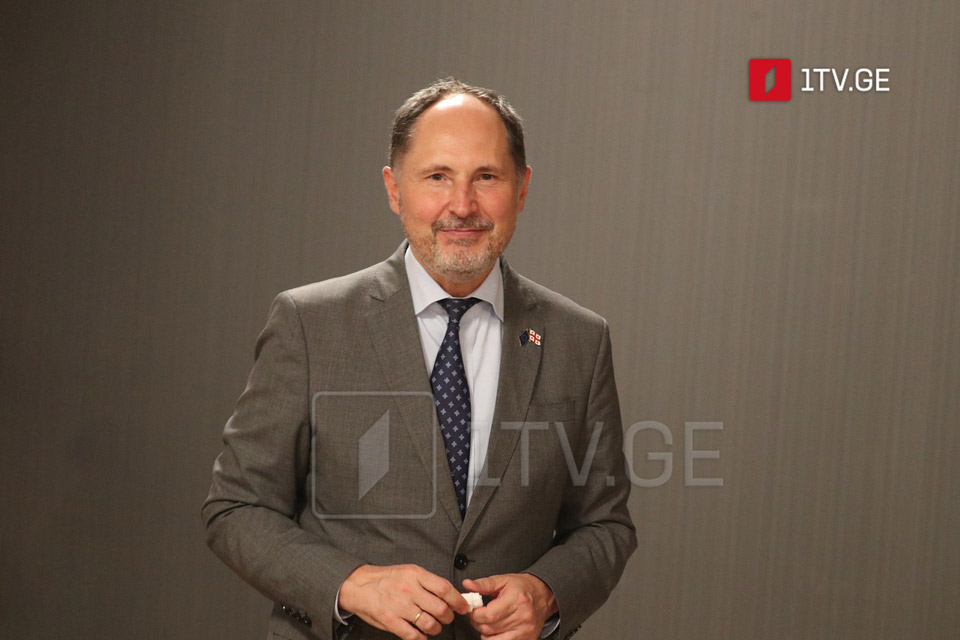Ambassador Herczynski: My role is to guide Georgia toward EU accession, not influence political choices
The European Union Ambassador to Georgia, Pawel Herczynski, emphasized that it is not his role to influence which party Georgians support, as doing so would constitute interference. His role, instead, is to clearly articulate what will help Georgia move closer to EU membership.
In response to questions about whether the statements and actions of Western partners could be seen as interference, Herczynski pointed out that his purpose is to present the EU’s position and outline what reforms are necessary for Georgia’s European integration.
“Georgia, over two years ago, has applied to become a member of the European Union. I have been sent here by the highest authority of the European Union to present the position of the European Union vis-a-vis Georgian authorities. It is not my role to tell Georgians what party to support, and what party not to support. That will be clearly interference. This is what I am not doing. But it is my role, as an ambassador of the European Union, to tell everyone loud and clear what is helping Georgia to advance in order to become a member of the European Union one day and what is actually contrary to Georgia’s becoming an EU member state.
And this is what I have been trying to do since day one. Also trying to help advance Georgia towards EU accession, which is supported as we know by the vast majority of Georgians, which is enshrined in your constitution and which is supported, as I understand, by all political parties. Sorry for not being modest. But I’m really happy that, as the European Union, finally, we have decided that Georgia has a possibility to become one of us, to join the European family. And it’s also my role to use all the instruments that we have as the European Union at our disposal to help to advance this process. But now this process is in the hands of judges and authorities.
We have said loud and clear what reforms are needed. We published, nearly a year ago, the first enlargement report with a very detailed recommendation of what needs to be done. We have translated this enlargement report into the so-called nine steps. It’s only one page. Everyone knows what needs to be done. However, as an EU ambassador in Georgia, it’s my responsibility to say loud and clear that the last several months have been lost, and unfortunately, instead of advancing on the reforms that were needed, that are needed, there are many adverse things going on. There were many decisions, and there were many legislative decisions, that instead of bringing Georgia closer to the European Union, were completely incompatible with our core values enshrined in the treaties, non-negotiable. I repeat, freedom, democracy, rule of law, rights of minorities. I sincerely hope, that after the elections, whoever will be elected by the Georgian people, we will very swiftly, not only make sure that our bilateral relationships are mutually beneficial because this we do with every single country in the world but that Georgia catches up and that we very quickly move forward on Georgia’s accession to the European Union. Because we want you to be one of us, to sit around the same table with the current leaders of the EU, and jointly decide about where our common future,” he said.
Regarding the comment made by Tbilisi Mayor Kakha Kaladze, who suggested that an EU ambassador making similar remarks in a developed country would be expelled, Herczynski declined to respond directly.
“Since day one, I have been very clear that I will not comment on the statements of others. This is not my role as the EU ambassador. My role as an EU ambassador is to present the position of the European Union. So, especially now, in the context of the ongoing electoral campaign, please forgive me, but I will not comment on this statement or any other statements. What I can say is that according to the diplomatic practice, there is always a possibility for any country to ask a foreign diplomat to leave. In recent months and years, unfortunately, we had several, actually many such cases in the case of some other countries,” the EU Ambassador added.

